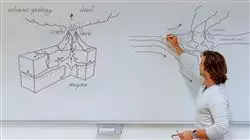University certificate
The world's largest faculty of education”
Description
Acquire all the necessary didactic resources to teach Science in an attractive way thanks to this Postgraduate diploma"

Primary Education teachers who work in the field of Science must know the most innovative and appropriate didactic procedures to awaken the interest of students. Therefore, it is not only important to have a comprehensive knowledge of these subjects, whether Natural Sciences or Social Sciences, but it is also essential that they acquire the necessary pedagogical strategies to effectively promote this knowledge in their classrooms.
For this reason, TECH has developed the most complete program of the moment on knowledge and teaching of Science, offering the student a unique opportunity to specialize in this field. Thus, the graduate will delve into concepts such as energy, magnetism, geology or biodiversity, to continue with the approach of economic activity and social organization in Europe or the different historical stages experienced in Spain. In addition, he will delve into the design of a didactic unit and ICT as a pedagogical resource, among other issues.
And all this, with a set of subjects and topics that are specially designed to allow each student to self-manage their time and decide their dedication. In addition, you will have access to an online space 24 hours a day with theoretical materials presented through enriched texts, multimedia presentations, exercises and guided practical activities, motivational videos and case studies.
This program is distinguished by the fact that it can be taken in a completely online format, which allows students to combine their studies with their personal and work responsibilities. This way, they can choose which days, at what time and how much time to dedicate to the contents of the program. A university program that is presented as the best option in the academic market
You only need an electronic device and an Internet connection to become an expert teacher in Science Education. A program tailored to you, with no demands and total flexibility"
This Postgraduate diploma in Teaching of Science in Primary Education contains the most complete and up-to-date educational program on the market. The most important features include:
- The development of case studies presented by experts in Teaching of Science in Primary Education
- The graphic, schematic, and practical contents with which they are created, provide practical information on the disciplines that are essential for professional practice
- Practical exercises where the self-assessment process can be carried out to improve learning
- Its special emphasis on innovative methodologies
- Theoretical lessons, questions to the expert, debate forums on controversial topics, and individual reflection assignments
- Content that is accessible from any fixed or portable device with an Internet connection
Theoretical materials, multimedia presentations, exercises and guided practical activities, motivational videos, etc. Innovative and disruptive multimedia content for acquiring quality and dynamic learning"
The program’s teaching staff includes professionals from sector who contribute their work experience to this educational program, as well as renowned specialists from leading societies and prestigious universities.
Its multimedia content, developed with the latest educational technology, will provide the professional with situated and contextual learning, i.e., a simulated environment that will provide an immersive education programmed to learn in real situations.
The design of this program focuses on Problem-Based Learning, by means of which the professional must try to solve the different professional practice situations that are presented throughout the academic course. For this purpose, the student will be assisted by an innovative interactive video system created by renowned experts.
Deepen your knowledge in the design and planning of learning processes in Natural and Social Sciences and become the expert that educational centers are looking for"

Take a step further in your professional career and compete with the best. Don't wait any longer and enroll now"
Syllabus
The contents of this program have been designed by a highly prestigious teaching team with extensive professional experience. In addition, they have the latest developments in the field of educational didactics in the sciences, which ensures the graduate an effective and quality update of knowledge. Thus, from module 1 the student will see their pedagogical skills broadened, which will enable him or her to grow professionally and aspire to new and great work challenges.

A curriculum designed by a prestigious teaching team to offer the most up-to-date content available"
Module 1. Knowledge of Natural Sciences in Primary Education
1.1. Scientific Knowledge
1.1.1. Scientific Knowledge
1.1.2. Inductivism
1.1.3. Falsificationism
1.1.4. Kuhn: the scientific paradigm
1.2. Our planet. The Earth
1.2.1. Our Solar System
1.2.2. The Earth: movements
1.2.3. The atmosphere that surrounds us
1.2.4. The quantities of mass and weight
1.3. The energy
1.3.1. Definition and concept of energy
1.3.2. Simple manifestations of energy
1.3.3. Energy Conservation
1.3.4. Energy transfer through mechanisms
1.4. Electricity and Magnetism
1.4.1. What is electrical energy?
1.4.2. Static electricity through Coulomb's Law
1.4.3. Electrical current through Ohm's Law
1.4.4. Magnetism and its ways
1.5. Various energy sources
1.5.1. What are energy sources?
1.5.2. Renewable Energies
1.5.3. Non-renewable energies
1.5.4. Matter: concept and characteristics
1.6. What is matter?
1.6.1. We pay attention to the structure of the material
1.6.2. What are pure substances and mixtures?
1.6.3. What are the properties of matter?
1.6.4. Some chemical reactions we found
1.6.5. Carbon Chemistry
1.7. Let's talk about Geology
1.7.1. Research of the interior of the Earth: Methods used
1.7.2. Minerals and rocks
1.7.3. The theory of plate tectonics
1.7.4. What is the cell?
1.8. The cell as a unit of life
1.8.1. Let's talk about prokaryotic cells.
1.8.2. Let's talk about the eukaryotic cell.
1.8.3. What are the main differences between cell types?
1.9. What is biodiversity?
1.9.1. Introduction
1.9.2. What are the kingdoms of nature?
1.9.3. The five kingdoms
1.9.4. Monera Kingdom
1.9.5. Protista Kingdom
1.9.6. Fungi Kingdom
1.9.7. Plant Kingdom
1.9.8. Animal Kingdom
1.9.9. What do we mean by ecology?
1.10. The human body and its evolution
1.10.1. Introduction
1.10.2. The human body and its functions
1.10.3. The three vital functions
1.10.4. Other non-vital functions
1.10.5. What is genetics? Do we all have it?
1.10.6. Evolution and its evidence
1.10.7. Some evolutionary theories
Module 2. Knowledge of Social Sciences in Primary Education
2.1. Earth in different contexts
2.1.1. Introduction: Representations of the Earth
2.1.2. The Earth represented in planes
2.1.3. The Earth represented in maps
2.1.4. Maps and their typologies
2.1.5. Use of conventional scales and signs
2.1.6. The Earth represented in planispheres
2.1.7. Conceptualization and practical application of parallels and meridians and coordinates
2.1.8. The Earth represented on a globe
2.1.9. Orientations about our spatial orientation. Is it as simple as we think or do we get lost?
2.2. Earth's atmosphere and climate
2.2.1. What is the atmosphere?
2.2.2. Let's talk about the greenhouse effect on Earth
2.2.3. Differences between weather and climate
2.2.4. Weather: maps, characteristics, elements
2.2.5. Climate: factors and elements
2.2.6. What is temperature?
2.2.7. What is precipitation?
2.2.8. What are the main climates of Spain?
2.2.9. What are climograms?
2.3. Hydrosphere, lithosphere and relief
2.3.1. Material system consisting of water: Hydrosphere
2.3.2. The solid, superficial layer of the Earth: Lithosphere
2.3.3. What is an ecosystem?
2.3.4. What is the environment?
2.3.5. Let's talk about biodiversity
2.3.6. Relief characteristics in Spain
2.3.7. Relief characteristics in Europe
2.3.8. Pollution and climate change the order of the day
2.4. Economic activity and social organization in Spain and Europe
2.4.1. Spain and its characteristics
2.4.2. Social Organization
2.4.3. Political Structure
2.4.4. Territorial organization
2.4.5. The European Union
2.4.6. World, European and Spanish population factors
2.4.7. Main productive activities in Spain and Europe
2.4.8. Transportation and road safety education
2.5. Spain in history
2.5.1. Main characteristics of the hominization process
2.5.2. The Paleolithic
2.5.3. The Neolithic
2.5.4. The Metal Age
2.5.5. Colonizations that have gone down in history. Tartessos
2.5.6. Pre-Roman villages
2.5.7. The long-awaited Roman conquest
2.5.8. Roman Hispania: political, social and economic organization
2.5.9. Romanization that took root
2.5.10. The barbarian invasions and the formation of the Visigothic kingdom
2.6. The Middle Ages as experienced in Spain
2.6.1. The Muslim conquest and al-Andalus
2.6.2. Politics, society, economy and culture of al-Ándalus
2.6.3. Evolution of the Christian kingdoms and feudalism in them.
2.7. Spain in times of monarchy and empire
2.7.1. Introduction: birth of the modern state
2.7.2. The Catholic Monarchs abroad
2.7.3. The successful conquest of America
2.7.4. The anguished religious politics, economy and society in the time of the Catholic Monarchs
2.7.5. The Renaissance
2.7.6. Spain as the Empire of Charles I
2.7.7. The Spain of Philip II
2.7.8. Economy, culture and society in the time of Philip II
2.8. Seventeenth and eighteenth century Spain
2.8.1. 17th century Spain: economy, culture and society.
2.8.2. The reign of Philip III (1598-1621)
2.8.3. The reign of Philip IV (1621-1665)
2.8.4. The reign of Charles II (1665-1700)
2.8.5. Eighteenth century Spain: economy, culture and society.
2.8.6. The War of Succession and the Treaty of Utrecht
2.8.7. Bourbons in Spain
2.8.8. The Enlightenment and its cultural manifestations
2.9. 19th Century Spain
2.9.1. Restoration is established in Spain
2.9.2. Evolution of Spanish society
2.9.3. Economy, society and culture in 19th century Spain.
2.10. From the 20th century to the present day in Spain
2.10.1. Political transformations and conflicts in the 20th century
2.10.2. Constant changes in the economy and society of the 20th century
2.10.3. Spanish culture in difficult times
2.10.4. Spanish democracy
Module 3. Didactics of Natural Sciences in Primary Education
3.1. Talking about Scientific Knowledge
3.1.1. Introduction to the Subject
3.1.2. The Current Situation of Science
3.1.3. Features of Experimental Sciences
3.1.4. What is the Scientific Method?
3.2. Relationship between Science Education and Primary Education
3.2.1. The Need for Science in Primary Education
3.2.2. Strategies for Science Education
3.2.3. Strategies for Teaching Science: Experiences
3.2.4. Strategies for Teaching Science: Project Work
3.2.5. Strategies for Teaching Science: Educational Videos
3.2.6. Strategies for Teaching Science: Adapted Language
3.2.7. The Analogy
3.2.8. Metaphors
3.2.9. Similes
3.2.10. Transpositions
3.3. The Practical Part of Science
3.3.1. Fundamental Strategies of Science
3.3.2. Observation
3.3.3. Experimentation
3.3.4. Measurement
3.3.5. Estimation
3.3.6. Inquiry
3.3.7. Scientific Activities: Importance, Classification and Design
3.3.8. A Laboratory Work
3.3.9. Field Work: Excursions, Itineraries, Visits to Museums, Industries and Workshops
3.4. Elements that Mark the Teaching of Science in Primary Education
3.4.1. Introduction
3.4.2. Learning objectives
3.4.3. Learning Planning
3.4.4. Assessment Criteria and their Representation
3.5. Design of a Teaching Unit(1.ªparte)
3.5.1. Assessment Criteria
3.5.2. Establishment of Objectives
3.5.3. Selection, Organization and Sequencing of Contents
3.5.4. Selection, Creation and Sequencing of Activities
3.5.5. Selection, Creation and Sequencing of Assessment Activities
3.6. Design of a Teaching Unit (Part 2)
3.6.1. Classroom Organization
3.6.2. Final Conclusions
3.6.3. Resources Used: Material Resources, Technological Resources, Teaching Resources, etc.
3.7. Pedagogical Approaches
3.7.1. The Use of Classical Approaches
3.7.2. Model-Based Teaching
3.7.3. Global Perspective on Science-Technology and Society
3.8. Concepts from Which Science Starts
3.8.1. Definition of Previous Concepts. What are they?
3.8.2. Non-Heterogeneity of Previous Concepts
3.8.3. Strategies for Extracting Previous Concepts from Learners' Starting Points
3.8.4. Conceptual Change
3.9. Cognitive Development of Children from 6 to 12 Years of Age
3.9.1. To Be Taken into Account
3.9.2. Characteristics of Children from 6 to 7 Years of Age
3.9.3. Characteristics of Children from 8 to 9 Years of Age
3.9.4. Characteristics of Children from 10 to 11 Years of Age
3.10. ICT as a Teaching Resource
3.10.1. What are ICTs?
3.10.2. Characteristics of ICT
3.10.3. Web Resources: Webquest, Treasure Hunt, Wikis, Educablog, Digital Comics
Module 4. Didactics of Social Sciences in Primary Education
4.1. Social Sciences in the 21st Century (Concept and Epistemological Field)
4.1.1. What do We Mean by Social Science? Conceptual Delimitation
4.1.2. Characteristics and Elements Common to All Social Sciences
4.1.3. Origin and Evolution of Some Social Sciences
4.1.4. Didactics of Social Sciences as Specific Didactics
4.2. Social Sciences Curriculum in Primary Education
4.2.1. The LOMCE Curriculum
4.2.2. Social Sciences in the Curriculum
4.2.3. Content, Assessment Criteria and Learning Standards
4.2.4. Technical Assessment
4.3. Didactic Strategies and Methods for Teaching- Learning in Social Sciences
4.3.1. Curricular Models in Social Sciences
4.3.2. Methodological Orientations: Physical, Intellectual and Psychological Characteristics
4.3.3. Methodological Strategies: Interaction, Cooperation and Participation
4.4. Geography
4.4.1. Concept of Space in Primary Education
4.4.2. The Visualization of the World from the Mind of Children in Primary Education
4.4.3. Teaching Geography through Maps
4.4.4. Teaching Geography through Fieldwork
4.5. History (Part 2)
4.5.1. Argumentation of the Teaching - Learning of History
4.5.2. Difference Between Chronological Time and Historical Time
4.5.3. Teaching and Learning Over Time
4.5.4. Variable Dimensions
4.6. History (Part 2)
4.6.1. Main Complications in the Teaching of History
4.6.2. from Teaching- Learning Process
4.6.3. Correct Formulation of Hypotheses
4.6.4. The Search for Quality Sources
4.6.5. Chance as a Learning Problem
4.7. Competencies Associated with the Social Sciences
4.7.1. To Speak of Competencies is to Speak of...
4.7.2. Social and Civic Competences
4.7.3. Cultural Awareness and Expressions
4.7.4. Competency-Based Assessment, the Right Thing to Do in the Social Sciences
4.8. Teaching Art in Primary Education
4.8.1. To Speak of Art is to Speaking About Artists
4.8.2. Full Analysis of the Works of Art
4.8.3. Art History: Resources for Teaching Art History
4.8.4. Recording and Observation Guidelines
4.9. Social Subjects
4.9.1. The Person as an Individual
4.9.2. The Person as a Social Being
4.9.3. Social Children, Happy Children
4.10. To Live in Society is to Live in Coexistence
4.10.1. The Social World in a Child's Mind
4.10.2. Strategies for Teaching in Society
4.10.3. Democratic Values
4.10.4. Citizenship Education

Acquire all the necessary knowledge to apply ICT to your educational planning in Geography and History"
Postgraduate Diploma in Science Didactics in Primary Education
Do you want to become an expert in science teaching for primary education? Look no further! TECH Technological Univertisy presents you with the Postgraduate Diploma in Science Didactics in Primary Education, a unique opportunity you can't miss. Imagine acquiring solid and updated pedagogical skills, specifically designed for teaching science at the primary level. With this virtual program, you will have the flexibility to study from anywhere and adapt it to your pace of life. Are you ready to immerse yourself in a world of knowledge and professional growth? Our team of teachers is made up of leading experts in the field of science education. They will guide you through your learning process, providing constant feedback and sharing their practical experience. Get ready to absorb their wisdom and gain new perspectives on science education.
Become a science teacher!
Become an expert in teaching science in elementary education
On completion of this program, you will earn a certificate recognized by the prestigious Faculty of Education at TECH Technological Univertisy. This certificate will support your specialized skills and knowledge, opening up job opportunities in the field of elementary education. During the course, you'll explore a wide variety of key topics, such as innovative teaching strategies, effective teaching methodologies and digital educational resources. In addition, you'll dive into the psychology of learning and discover how to motivate your students to become passionate about science from an early age. Studying at TECH Technological Univertisy provides you with an incredible opportunity for personal and professional growth. Our cutting-edge academic approach, combined with technological innovation, will prepare you to excel in education and make a difference in the lives of your students. Upon completion of this program, you'll be prepared to meet the challenges of the classroom with confidence and enthusiasm. enroll today and begin your path to a rewarding career full of possibilities!







